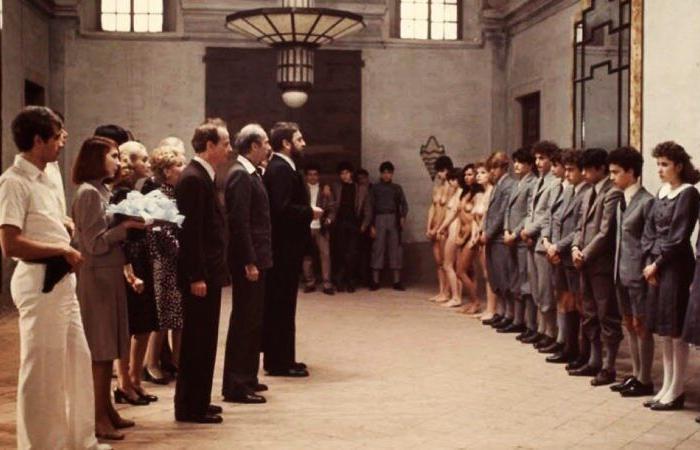Salò or the 120 Days of Sodom is a 1975 film directed by Pier Paolo Pasolini. It is one of the most controversial and discussed films in the history of cinema, known for its extreme content and its fierce criticism of society and power. The film is freely inspired by the book “The 120 Days of Sodom” by the Marquis de Sade and transports the action to fascist Italy in the 1940s, precisely to the Republic of Salò. The plot revolves around four powerful individuals – a Duke, a President, a Monsignor and a Magistrate – who kidnap a group of teenage boys and girls to subject them to physical and psychological torture in an isolated villa. The violence and humiliation to which young prisoners are subjected become increasingly extreme and degrading, representing a fierce criticism of the corruption and depravity of power.
In 1975, Pier Paolo Pasolini adapted one of the masterpieces of eighteenth-century libertine literature, written by the Marquis de Sade, making his last film, “Salò or the One Hundred and Twenty Days of Sodom”. This film, which Pasolini was unable to edit definitively, is structured into four main sections: an Antinferno and three groups inspired by Dante’s “Divine Comedy”.
In the first part, which acts as a prologue, the story is prepared. Four powerful gentlemen (the Duke, the Monsignor, the President of the Court of Appeal and President Durcet) have a group of young people kidnapped by Republican soldiers, setting everything in occupied Italy between 1944 and 1945. The four gentlemen examine the prisoners carefully, finally selecting nine boys and nine girls, who are taken to a villa near Salò.
Once they reach their destination, the young people are shown the lifestyle they will have to follow for the next one hundred and twenty days. They will be forced to comply with the arbitrary regulations imposed by the four lords, with the threat of severe physical punishment, ranging from the amputation of limbs to the death sentence, for anyone who dares to transgress.
The fundamental rule is that the inmates will have to submit to the sexual perversions of their tormentors, while in the “orgy room” they will listen to the stories of the three narrators (Mrs. Vaccari, Mrs. Maggi and Mrs. Castelli), former prostitutes chosen specifically to entertain with the stories of their past relationships. A fourth woman, acting as a pianist, will accompany with melodies to enrich the atmosphere.
In the circle of manias, stimulated by Mrs. Vaccari’s stories, the gentlemen will inflict all sorts of torture on the prisoners, with the complicity of the Republican soldiers. Among the atrocities described, there is the scene in which the young people, forced to walk on all fours, compete for scraps of food, some of which contain nails.
The circle of shit is dominated by Mrs. Maggi, who narrates episodes centered on anality, culminating in a banquet based on human excrement to celebrate the marriage between one of the lords and a prisoner.
The circle of blood, which represents the pinnacle of perversion, opens with a story by Mrs. Castelli. In this section, prisoners are transformed into informers of the infractions committed by other inmates, thus completing the cycle of degradation and violence.
To remedy these crimes, a small group is chosen among the boys who will take the place of the new tormentors. A monstrous bloody orgy follows where all sorts of atrocities are committed, while the Lords engage in hysterical ballets and acts of necrophilic sex on their victims. The film ends, surprisingly, with a misleading epilogue: while the carnage is taking place in the courtyard, two bored republicans change the radio channel (which was broadcasting Carmina Burana) and, to the tune of the song Son tanto Sad, they start dancing.
“Salò” by Pier Paolo Pasolini is a mediated cinematic transposition of Sade’s text, which paroxystically explores some crucial aspects of philosophical and political thought. These aspects include the denial of the self-determination of individuals, the indissoluble intertwining of power and violence, the perverse and sadistic side of sovereignty, the human body and its physiological functions as privileged instruments of power, and law understood not as guarantee of life, but as a prelude to death.
Pasolini, taking up a recurring theme in the critical literature on sadism, highlights the terrifying figure of the complicit victim, who accepts the executioner’s whip with servile obedience. In one of his “Corsair Writings”, Pasolini observes that “there is no executioner’s plan that is not suggested by the gaze of the victim”[1]. The docile victim, who respects her tormentor and agrees to his every request, ends up enjoying the violence she suffers, establishing an obscene complicity with her tormentor that allows her to survive. In doing so, sadistic power loses its hold on her, as she can no longer impose its will on a body that no longer rejects the blows. The sadistic norm is thus deactivated by the affected subject who no longer wishes to or can escape the beatings.
The film, therefore, can be interpreted as a series of reflections on what, in every historical era, power inflicts on the individual considered as an “object”. Pasolini refers in particular to the negative influence that the mass media, controlled by a corrupt market, has on young people.
“Everyone in Italy feels the degrading anxiety of being equal to others in consuming […]: because this is the order that he has unconsciously received and which he must obey […]. Never has diversity been such a frightening sin as in this period of tolerance”.[2]
This, therefore, is the conviction with which Pasolini gets to work and delivers this film to posterity; a film whose purpose appears clearly to us in another Pasolini statement: “I was interested in seeing how power acts by dissociating itself from humanity and transforming it into an object. And again: Nel power, in any power […] there’s something beautiful about it. In its code and its practice, in fact, nothing other than sanctioning and making actualized the most primordial and blind violence of the strong against the weak “[…][3].
Firstly, those familiar with Pasolini’s ideology regarding the conditions of Italian society at the time will know that Pasolini firmly believed that consumerist neo-fascism reduced men to slaves, alienated machines dedicated exclusively to consumption (reviving a Marxian theme).
From this perspective, in the villa of Salò there is an explanation of this theory: when power is separated from society and norms (the laws here are dictated by the executioners themselves), it is free to commodify man, abusing him for its own purposes. liking.
Faced with a world that is described as globalist and pacified while it is once again immersed in the ferocious cynicism of Capital’s fratricidal war, the greatest challenge of the future will be to be able to distinguish, in the apparent horizontality in which it is camouflaged, the real excessive power of the integrated : separate it from the need for the re-appropriation of the world by the new generations, involuntary apocalyptics, condemned to face a future on the brink of epochal catastrophe.
For this reason, finding “Salò” as the mysterious and impenetrable wreck of a “corsair” ship sunk in the sea of all-logical media indifference, and wandering around its disturbing coldness, so irreconcilable with the glittering images of self-narration, can help to understand the profoundly human nature of the evil inherent in the metastasis of power and its psychological and physical tortures (those of the past as well as the current ones).
This awakening to the never-dormant barbarism of the world can make us recognize the existence of the unacceptable, allowing us to innocently regain the right to refuse it.
Daniele Onori
[1] PP PASOLINI, Essays on politics and societyedited by Walter Siti and Silvia de
Laude, Mondadori, Milan 1999, p. 481.
[2] Pier Paolo Pasolini, Italians are no longer the same; article in the Corriere on 11 July 1974
[3] Pier Paolo Pasolini, in a self-interview with Corriere on 25 March 1975






